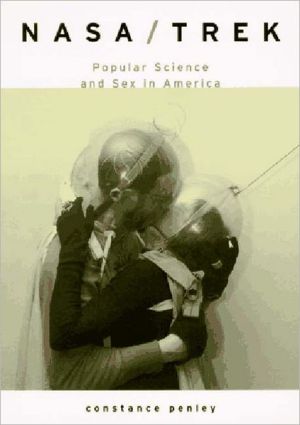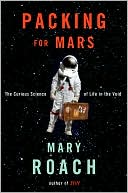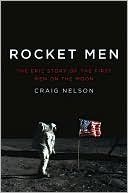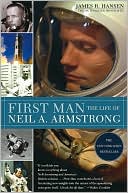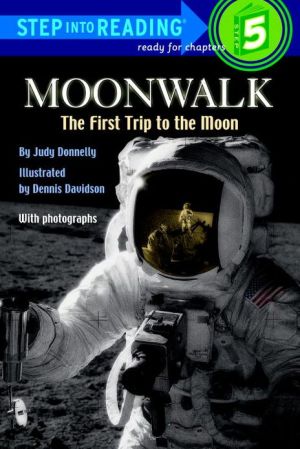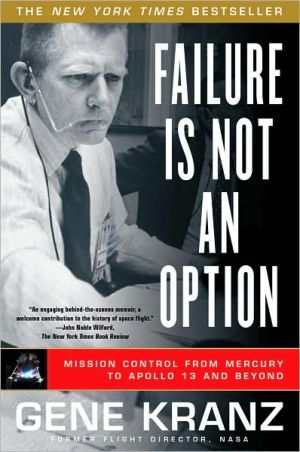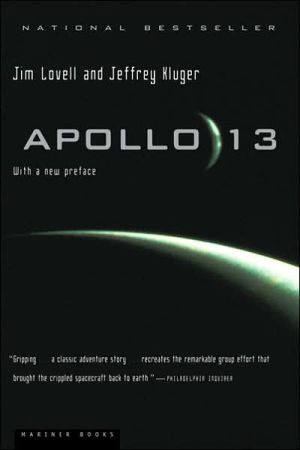Nasa/Trek
An investigation and celebration of Americans' fascination with space. The legionof jokes that circulated in the wake of the Challenger space shuffle disaster helped alleviate the shock and horror of very public death. But as the jokes demonstrate, they also revealed a widely held prejudice that space is no place for a woman. And yet, as this wry and highly readable investigation of the role of space travel in popular imagination argues, the relationship between space and sex is more...
Search in google:
An investigation and celebration of Americans' fascination with space. The legionof jokes that circulated in the wake of the Challenger space shuffle disaster helped alleviate the shock and horror of very public death. But as the jokes demonstrate, they also revealed a widely held prejudice that space is no place for a woman. And yet, as this wry and highly readable investigation of the role of space travel in popular imagination argues, the relationship between space and sex is more complicated than it first appears. NASA itself, in a scramble to protect its funding, has turned to icons of popular culture which play fast and loose with sexual stereotypes. Nowhere is this more evident than in the space agency's open borrowing from the hugely popular Star Trek. The test model for the shuttle was named after the starship Enterprise, NASA personnel name their computers after Spock, and NASA hired Lieutenant Uhura to assist in its recruitment of women and minorities. Meanwhile Star Trek is reshaped by networks of women fans producing samizdat porno-romance fanzines that star Spock and Captain Kirk in a homosexual relationship. Completing the orbit, the subversions of the fans are reintegrated by the show's producers. In one movie, Kirk approaches Spock, arms extended for a manly embrace. "Please, Captain," the ever proper Spock demurs, "not in front of the KIingons." In much witty detail, Penley illustrates Star Trek fans' criticisms of the show's inability to include women -- and issues of sex and sexuality -- in the world of science and technology. NASA, too, fails in the same way. To counter official versions of science, the fans propose instead a popular science that boldly goeswhere no one has gone before but which remains answerable to human needs and social desires. Standing four square in the American utopian tradition, it maintains that scientific experimentation should be accompanied by social and sexual experimentation, and devoted to exploring inner as well as outer space. Kirkus Reviews A clever and iconoclastic dual portrait of the NASA space program and Star Trek fandom from a feminist perspective.Penley (Film and Women's Studies/Univ. of Calif., Santa Barbara) grew up near Cape Canaveral, and her childhood was shaped in large part by predawn dashes with her father to watch rockets being launched. These unusual excursions, mixed with a heavy dose of Kennedy-era liberalism, led to Penley's lifelong love of NASA and of the whole notion of space exploration. But her vision of the program, while positive overall, is hardly idealized. Using the Christa McAuliffe/Challenger tragedy as a base for her extensive criticisms in the first half of the book, Penley shows persuasively that women in the space program have consistently been held to a different—usually higher—standard; that the choice of McAuliffe and the publicity surrounding her training were sexist and demeaning; and that NASA covered up the full extent of the disaster and then memorialized the event poorly. The second half of the book deals mostly with the homoerotic cottage porn industry that has grown up around Star Trek. Penley is sufficiently insightful and persuasive to make this leap in the narrative entirely convincing. Captain Kirk and Mr. Spock are seen in these fantasies (which are largely invented by heterosexual women, according to Penley) as gay lovers. NASA/Trek offers a witty illumination of the strong relationship between the cultures of NASA and Star Trek, arguing that it exists not just in each co-opting the other's symbols and characters (Nichelle Nichols, Lt. Uhura on the original show, was a successful recruiter of women and minorities for NASA), but in their sharing of themes and goals for the future. Boldly—and successfully—goes where no one has gone before.
Popular Science1Nasa11Trek97Popular Sex147Notes149Acknowledgments163Index167
\ Kirkus ReviewsA clever and iconoclastic dual portrait of the NASA space program and Star Trek fandom from a feminist perspective.\ Penley (Film and Women's Studies/Univ. of Calif., Santa Barbara) grew up near Cape Canaveral, and her childhood was shaped in large part by predawn dashes with her father to watch rockets being launched. These unusual excursions, mixed with a heavy dose of Kennedy-era liberalism, led to Penley's lifelong love of NASA and of the whole notion of space exploration. But her vision of the program, while positive overall, is hardly idealized. Using the Christa McAuliffe/Challenger tragedy as a base for her extensive criticisms in the first half of the book, Penley shows persuasively that women in the space program have consistently been held to a different—usually higher—standard; that the choice of McAuliffe and the publicity surrounding her training were sexist and demeaning; and that NASA covered up the full extent of the disaster and then memorialized the event poorly. The second half of the book deals mostly with the homoerotic cottage porn industry that has grown up around Star Trek. Penley is sufficiently insightful and persuasive to make this leap in the narrative entirely convincing. Captain Kirk and Mr. Spock are seen in these fantasies (which are largely invented by heterosexual women, according to Penley) as gay lovers. NASA/Trek offers a witty illumination of the strong relationship between the cultures of NASA and Star Trek, arguing that it exists not just in each co-opting the other's symbols and characters (Nichelle Nichols, Lt. Uhura on the original show, was a successful recruiter of women and minorities for NASA), but in their sharing of themes and goals for the future.\ Boldly—and successfully—goes where no one has gone before.\ \ \
